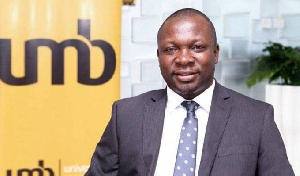The country’s banking industry is saddled with too many ‘small’ banks that lack capacity to deal with big ticket projects, CEO of Universal Merchant Bank (UMB) John Awuah has said; adding that the central bank must push through a consolidation agenda in order to create stronger banks.
Mr. Awuah’s comments follow a ranking made by The Africa Report of the Top 100 banks in Africa, in which not a single bank among the 29 or so banks operating in Ghana was able to make the list.
The list had banks drawn from as many as 17 African countries including Togo and Burundi, but none was from Ghana.
Too many ‘small’ banks in operation
Mr. Awuah speaking in an interview with the B&FT said: “Banks in the country cannot operate in little pieces and expect to grow to the level that you can find in South Africa, Nigeria or North Africa.
“The situation going on in the country at the moment is not one to be proud of, where big projects are happening around us -- for example the Airport City project – and funding comes from offshore because local banks lack capacity to handle such transactions.
“My view is that there is need for some level of consolidation to create megabanks. In the top-20 banks you can find at least two Nigerian banks. If this ranking had been done 10-15 years ago, you would probably not have found those banks.
“Previously Nigeria had more than 80 banks, but regulation drove those banks to talk to each other and consolidate -- now Nigeria has less than 30 banks for a country of 200 million people, while in Ghana with a population of less than 30 million we have close to 30 banks,” he said.
A survey done by the B&FT of some 28 banks operating in Ghana revealed that they had at least GH¢55billion of assets, about US$15billion, compared to the US$2.7billion of Export Development Bank of Egypt, the least-ranked bank on the list – which shows the financial muscle of banks that made the ranking.
“So the point is to be in that prestigious league you must have scale, and must have the size and capital to address the basic needs. In any advanced country, government borrows from banks and financial institutions. When it comes to project and infrastructure financing, our government interaction - apart from banks putting their monies in securities - is very poor. We don’t have the capacity to handle, or the banks do not have the capital to accommodate, the size of exposures,” he stated.
Over the years there has been some form of consolidation in the banking sector. Notable among them is Ecobank’s acquisition of TTB, Access Bank and Intercontinental Bank, among a few examples.
Mr. Awuah stated that successful consolidation in the banking sector would require a deliberate effort led by the central bank.
“If you leave consolidation for the market to drive the process, it will lead to some banks talking to each other but it will be slower. In any part of the world where this has happened, it is the central bank that has taken charge and through regulation and capital requirements forced banks to group together and become megabanks,” he said.
Mr. Awuah, who is marking his first anniversary as CEO of UMB, said in the absence of efforts by the central bank to push consolidation in the sector, the bank under his leadership has put in place an ambitious plan that will see it growing from where it currently is.
“We have growth plans which are significantly over and above what our peers have or what competitors have planned. I wouldn’t say we have immediate plans for consolidating or joining forces with any bank…but if it becomes a regulatory requirement and timelines and deadlines exist, there is a potential for all banks to open up to discussions with other banks with the possibility of joining forces,” he said.
Business News of Wednesday, 15 June 2016
Source: B&FT

















